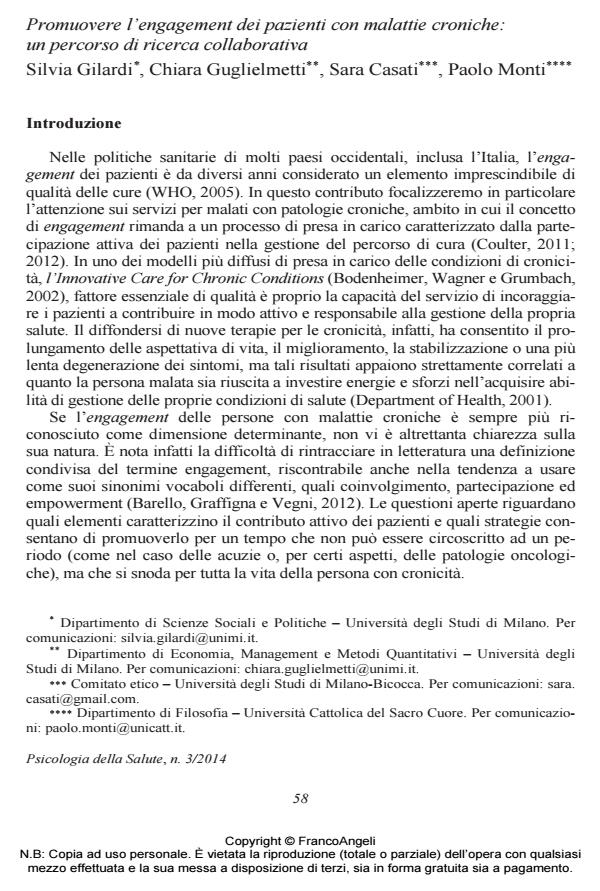Promoting engagement in chronic illness patients: a collaborative research pathway
Journal title PSICOLOGIA DELLA SALUTE
Author/s Silvia Gilardi, Chiara Guglielmetti, Sara Casati, Paolo Monti
Publishing Year 2014 Issue 2014/3
Language Italian Pages 22 P. 58-79 File size 138 KB
DOI 10.3280/PDS2014-003004
DOI is like a bar code for intellectual property: to have more infomation
click here
Below, you can see the article first page
If you want to buy this article in PDF format, you can do it, following the instructions to buy download credits

FrancoAngeli is member of Publishers International Linking Association, Inc (PILA), a not-for-profit association which run the CrossRef service enabling links to and from online scholarly content.
Patient engagement is recognized as essential for the quality of services for chronic diseases. The paper aims to explore the socio-organizational dynamics associated with the promotion of patients’ engagement and their transformation from passive consumers of medical services to partner. We present a collaborative study conducted with two health care services of a large hospital in Northern Italy, where patients and healthcare personnel cooperated to evaluate and reorient the clinical pathways towards participated processes centered on the patient. Practices were analyzed through a revised version of proactive analysis (HFMEA) and the psycho-social analysis of decision nodes of the clinical pathway, applied in the context of focus groups with mixed composition (patients, physicians, nurses, psychologists, social workers). Results revealed different representations of the nature of engagement and its nature as a changing and unstable process. In addition, the study highlighted professional assumptions and values that can give rise to an apparent participation. The study offers indications for designing collaborative practices in managing clinical pathways.
Keywords: Chronic illness, patient engagement, participatory research, focus group, HFMEA.
- Health Care Services and the Coproduction Puzzle: Filling in the Blanks Maddalena Sorrentino, Chiara Guglielmetti, Silvia Gilardi, Marta Marsilio, in Administration & Society /2017 pp.1424
DOI: 10.1177/0095399715593317 - Co-production in the Public Sector Gaia Bassani, Cristiana Cattaneo, Giovanna Galizzi, pp.59 (ISBN:978-3-319-30556-1)
- Il trattamento psicoterapeutico nella Sindrome Fibromialgica: le applicazioni della terapia dinamica breve in un setting ospedaliero italiano Annunziata Romeo, Valentina Tesio, Benedetta Vicino, Fabrizio Colonna, Enrico Fusaro, Daniela Converso, Lorys Castelli, in PSICOLOGIA DELLA SALUTE 1/2019 pp.119
DOI: 10.3280/PDS2019-001007
Silvia Gilardi, Chiara Guglielmetti, Sara Casati, Paolo Monti, Promuovere l’engagement dei pazienti con malattie croniche: un percorso di ricerca collaborativa in "PSICOLOGIA DELLA SALUTE" 3/2014, pp 58-79, DOI: 10.3280/PDS2014-003004